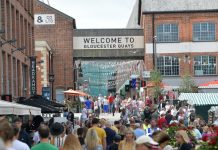It will come as no surprise that the Bristol office markets have experienced a significant drop in the volume of transactions during the Covid:19 lockdown, compared to the ten-year quarterly average. The negative effect on take-up is evident across all the Big Nine cities in the UK, as reported in Avison Young’s Q2 Big Nine Report. Across these markets – Bristol, Cardiff, Manchester, Leeds, Glasgow, Edinburgh, Liverpool, Newcastle and Birmingham – the total level of take-up is the lowest since data was first recorded for the Avison Young report in 2009.
Transaction volumes in Bristol during Q2 amounted to 53,000 sq ft in the city centre and 10,800 sq ft out-of-town. The total of 63,800 sq ft compares to the ten-year total quarterly average of 230,000 sq ft.
Paul Williams, director at Avison Young in Bristol says, “These figures come as no surprise. During the quarter there have been significant practical difficulties in conducting viewings and due diligence with occupiers either delaying or putting their occupational requirements on hold while many have been reassessing their spatial requirements.
“Perhaps more of a surprise is that the half year figure for the Bristol city centre market is actually 15% higher than that recorded in 2019, boosted by the pre-letting of 74,000 sq ft at the Halo building to Osborne Clarke in Q1, and we believe there is a far from gloomy prognosis for the market as activity starts to return.
“At the beginning of the year we reported that the Bristol property market was well placed to weather the Covid storm, and we continue to maintain that view, albeit there are clearly some significant challenges ahead. As the restrictions on lockdown are now eased, we expect activity to improve as the year progresses. And with strong interest on more than 50% of the recently refurbished 2 Trinity Quay building, for example, we believe rumours of the death of the office to be exaggerated.”
Paul continues, “Whilst there will undoubtedly be an increase in agile working in the future, with many occupiers now assessing their working practices in the light of recent events, working from home certainly doesn’t suit everyone. In particular the serviced office sector is likely to benefit as companies seek to add a flexible element to their office provision, although co-working may have to take a back seat until the threat of the virus is passed, or a vaccine has been developed and made widely available.”
In Bristol city centre there were two deals of more than 10,000 sq ft: 21,500 sq ft to the Secretary State for Housing, Communities and Local Government at 123 Winterstoke Road and 14,200 sq ft at One Brunswick Square to Chiaro Technology Limited. Also, flexible workplace provider Instant Offices has taken 4,900 sq ft at One Castlepark, on behalf of Highways England.
Positively, development activity has continued through lockdown. This includes the previously mentioned 110,000 sq ft Halo at Finzels Reach, recently bought by Tesco Pension Fund, and 93,000 sq ft Distillery at Glassfields. The 34,000 sq ft 1 Portwall Square scheme by Nord Development is expected to get underway soon. In addition, some significant refurbishment projects are either under way or on the cards including Pivot + Mark (formerly Bridge House), Baldwin Street, and South Plaza, which is to be renamed as 360 Bristol.
The forward-funding by Tesco Pension Fund of Cubex and Fiera Real Estate’s Halo development for £70m, has been the silver lining in the city’s investment market. It was in fact the largest deal across the Big Nine markets of the quarter. The markets have seen a handful of circa £20 million deals in established out-of-town locations, including the purchase of 2620 Aztec West in Bristol by M7 Real Estate for £21 million.
Headline rents in Bristol city centre are currently holding up at £35.50 psf but anecdotally rent-free periods are moving out reflecting the delays caused by Covid and the difficulties tenants have experienced in fitting out and occupying space.























